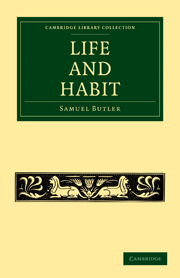Book contents
- Frontmatter
- PREFACE
- Contents
- CHAP. I ON CERTAIN ACQUIRED HABITS
- CHAP. II CONSCIOUS AND UNCONSCIOUS KNOWERS—THE LAW AND GRACE
- CHAP. III APPLICATION OF FOREGOING CHAPTERS TO CERTAIN HABITS ACQUIRED AFTER BIRTH WHICH ARE COMMONLY CONSIDERED INSTINCTIVE
- CHAP. IV APPLICATION OF THE FOREGOING PRINCIPLES TO ACTIONS AND HABITS ACQUIRED BEFORE BIRTH
- CHAP. V PERSONAL IDENTITY
- CHAP. VI PERSONAL IDENTITY—(continued)
- CHAP. VII OUR SUBORDINATE PERSONALITIES
- CHAP. VIII APPLICATION OF THE FOREGOING CHAPTERS — THE ASSIMILATION OF OUTSIDE MATTER
- CHAP. IX ON THE ABEYANCE OF MEMORY
- CHAP. X WHAT WE SHOULD EXPECT TO FIND IF DIFFERENTIATIONS OF STRUCTURE AND INSTINCT ARE MAINLY DUE TO MEMORY
- CHAP. XI INSTINCT AS INHERITED MEMORY
- CHAP. XII INSTINCTS OF NEUTER INSECTS
- CHAP. XIII LAMARCK AND MR. DARWIN
- CHAP. XIV MR. MIVART AND MR. DARWIN
- CHAP. XV CONCLUDING REMARKS
CHAP. IX - ON THE ABEYANCE OF MEMORY
Published online by Cambridge University Press: 29 August 2010
- Frontmatter
- PREFACE
- Contents
- CHAP. I ON CERTAIN ACQUIRED HABITS
- CHAP. II CONSCIOUS AND UNCONSCIOUS KNOWERS—THE LAW AND GRACE
- CHAP. III APPLICATION OF FOREGOING CHAPTERS TO CERTAIN HABITS ACQUIRED AFTER BIRTH WHICH ARE COMMONLY CONSIDERED INSTINCTIVE
- CHAP. IV APPLICATION OF THE FOREGOING PRINCIPLES TO ACTIONS AND HABITS ACQUIRED BEFORE BIRTH
- CHAP. V PERSONAL IDENTITY
- CHAP. VI PERSONAL IDENTITY—(continued)
- CHAP. VII OUR SUBORDINATE PERSONALITIES
- CHAP. VIII APPLICATION OF THE FOREGOING CHAPTERS — THE ASSIMILATION OF OUTSIDE MATTER
- CHAP. IX ON THE ABEYANCE OF MEMORY
- CHAP. X WHAT WE SHOULD EXPECT TO FIND IF DIFFERENTIATIONS OF STRUCTURE AND INSTINCT ARE MAINLY DUE TO MEMORY
- CHAP. XI INSTINCT AS INHERITED MEMORY
- CHAP. XII INSTINCTS OF NEUTER INSECTS
- CHAP. XIII LAMARCK AND MR. DARWIN
- CHAP. XIV MR. MIVART AND MR. DARWIN
- CHAP. XV CONCLUDING REMARKS
Summary
Let us assume, for the moment, that the action of each impregnate germ is due to memory, which, as it were, pulsates anew in each succeeding generation, so that immediately on impregnation, the germ's memory reverts to the last occasion on which it was in a like condition, and recognising the position, is at no loss what to do. It is plain that in all cases where there are two parents, that is to say, in the greater number of cases, whether in the vegetable or animal kingdoms, there must be two such last occasions, each of which will have an equal claim upon the attention of the new germ. Its memory would therefore revert to both, and though it would probably adhere more closely to the course which it took either as its father or its mother, and thus come out eventually male or female, yet it would be not a little influenced by the less potent memory.
And not only this, but each of the germs to which the memory of the new germ reverts, is itself imbued with the memories of its own parent germs, and these again with the memories of preceding generations, and so on ad infinitum; so that, ex hypothesi, the germ must become instinct with all these memories, epitomised as after long time, and unperceived though they may well be, not to say obliterated in part or entirely so far as many features are concerned, by more recent impressions.
- Type
- Chapter
- Information
- Life and Habit , pp. 150 - 165Publisher: Cambridge University PressPrint publication year: 2009First published in: 1878



